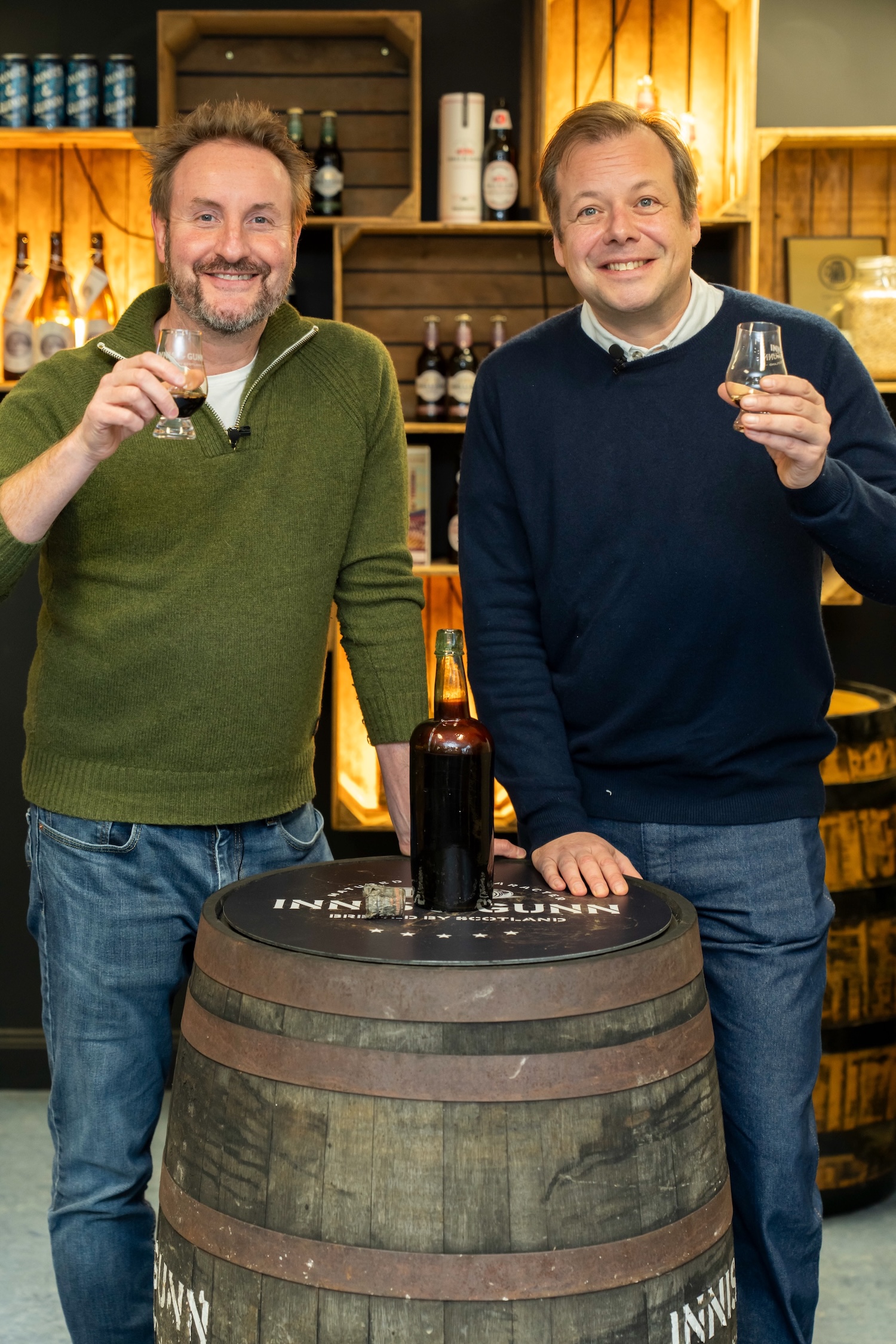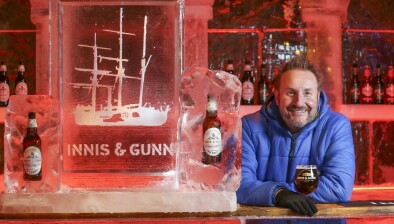History uncorked as bottle of 19th century arctic ale opened for the first time in 150 years as part of plan to recreate ancient brew

Jamie Allsopp, director at Allsopp’s and a direct descendent of the brewer's founders, and Dougal Gunn Sharp, founder and head brewer at Innis & Gunn (credit: Elaine Livingstone)
A 150-year-old bottle of one of the world’s rarest beers has been opened for the first time since the 19th Century as part of a project to recreate the Victorian ale originally brewed to sustain Arctic explorers.
The bottle of Allsopp’s Arctic Ale, produced in 1875 for Sir George Nares’ attempt to reach the North Pole, was uncorked on Thursday at the Innis & Gunn Brewery in Perth by the Scottish company’s founder, Dougal Gunn Sharp, and Jamie Allsopp, director of the revived Allsopp’s Brewery and a direct descendant of the beer’s original creators.
Thought to be one of only a handful of surviving bottles, the ale was described as ‘astonishingly well preserved’ as the pair tasted it moments after opening.
Mr Sharp, who acquired the 750ml bottle at auction for over £3,000 more than a decade ago after it was found in a Shropshire garage, said: “We’ve made history today and you can literally taste it.
“I’ve waited 10 years to try this, and the flavour of the beer was incredible – it didn’t disappoint and testament to the skill and thoroughness of the Allsopp’s brewers more than 150 years ago. It started with a savoury, Bovril like flavour, then sweetness like treacle with the weight of a good sherry, and an undeniable hoppiness despite the incredibly high sugar content. It’s like nothing I’ve ever tasted before.
“There’s something magical about knowing that every drop of Innis & Gunn 1875 Arctic Ale will now have this direct link to the expedition, and part of the UK’s maritime and brewing history. This new beer will blow people’s socks off.”
Allsopp, who had never tasted an original Allsopp’s Arctic Ale before, said sampling the beer made by his forebears was “a rare, emotional moment”, adding: “This ale was brewed for survival in some of the harshest conditions imaginable, and to open it again today creates a direct line to the people and the purpose behind it.
“It was described in 1851 as mellow as aged Madeira, and nourishing as a beefsteak – and that is as true today as it was 175 years ago. To finally taste something as special as this truly blows my mind. It’s a privilege to work with Innis & Gunn on a project so utterly mad and also brilliant. It also confirms that Allsopp’s really do make brilliant beer.”
After tasting, part of the Victorian ale was poured into the first brew of a new limited-edition recreation, the Innis & Gunn 1875 Arctic Ale, which is being made to the original Allsopp’s recipe using authentic malt and hop varieties from the period. The remaining beer will be preserved for archive and research use.
Mr Sharp added: “Pouring that beer into the brew was one of the most nerve-racking experiences of my life, but what it may become is definitely the most exciting. We’ve never done anything as ambitious as this before, and it’s born of the same spirit and endeavour demonstrated by those arctic explorers 150 years ago. It will be truly special.”
Arctic Ale was originally brewed in Burton-upon-Trent as a “strong and nutritive” beer capable of resisting freezing temperatures. With an alcohol strength of around 9% and six times the calorie content of a modern beer, it was designed to nourish sailors operating in temperatures as low as -40°C. Brewing records from the time described it as so thick it had to be lifted from the copper in buckets and “suggestive of old Madeira”.
The 1875 expedition was the last of three major Arctic voyages supplied with Allsopp’s Arctic Ale, following missions in 1852 and 1857 to search for the lost Franklin expedition. Although the voyages ended in hardship, the beers brewed for them went on to acquire an almost mythical status among collectors and brewers. Few bottles remain; one from the 1852 batch made headlines when it sold for more than $580,000 on eBay, although the sale is believed not to have been completed.
The recreation batch will now ferment over the coming weeks, with the finished beer set to launch in early December across Innis & Gunn taprooms in Edinburgh and Glasgow, Allsopp’s pubs in London, and selected stockists. A small number of hand-bottled editions will be offered through a public ballot.
Mr Sharp said the aim was to “bring a lost chapter of brewing history back into the present” rather than keep the bottle as a collector’s item.
He said: “This beer survived a century and a half. Opening it and allowing it to live again in a new brew feels like the right way to honour it.”







